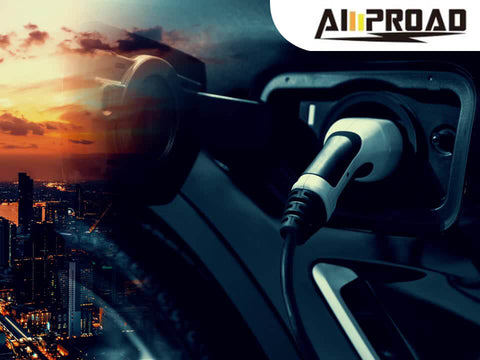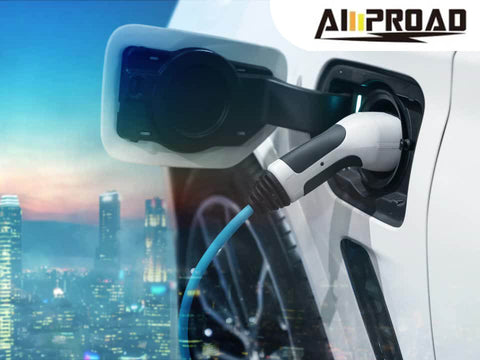
With concerns over environmental impact and rising fuel costs, electric vehicles (EVs) have surged in popularity. Their eco-friendly nature and potential long-term cost savings make them an attractive option for many drivers.
Home charging solutions are essential for EV owners, providing convenience and ensuring their vehicle is always ready to go. Charging at home also eliminates the need for frequent visits to public charging stations, saving time and money.
Portable Level 2 EV chargers offer a convenient solution for home charging. Unlike stationary chargers, they can be easily transported and used wherever there's access to a power outlet, providing flexibility for EV owners on the go.
Benefits of Portable Level 2 EV Chargers
Flexibility: Ability to charge EVs at home and on the go
Portable Level 2 EV chargers offer unparalleled flexibility for electric vehicle (EV) owners. Unlike stationary chargers, which are typically fixed in one location, portable chargers can be used at home, at work, or on the road. This flexibility allows EV owners to charge their vehicles wherever there's access to a power outlet, providing convenience and peace of mind, especially during long trips or when public charging stations are unavailable.
Faster Charging: Increased charging speeds compared to Level 1 chargers
One of the most significant advantages of portable Level 2 EV chargers is their ability to deliver faster charging speeds compared to Level 1 chargers. While Level 1 chargers typically provide around 4-5 miles of range per hour of charging, portable Level 2 charging can deliver up to 25 miles of range per hour, significantly reducing charging times. This increased charging speed is especially beneficial for EV owners with busy lifestyles or those who rely on their vehicles for daily commuting, allowing them to spend less time waiting for their vehicles to charge and more time on the road.
Convenience: No need for permanent installation, easy to transport
Unlike stationary Level 2 chargers, which require professional installation and may not be suitable for renters or those living in apartments, portable Level 2 EV chargers are incredibly convenient to use. They typically come with a standard plug that can be easily connected to a 240-volt outlet, eliminating the need for complex wiring or permanent installation. Additionally, their compact and lightweight design makes them easy to transport and store, allowing EV owners to take them wherever they go, whether it's on a road trip or to a friend's house.
Cost-Effectiveness: Lower installation costs compared to stationary Level 2 chargers
Another significant advantage of portable Level 2 EV chargers is their cost-effectiveness. While stationary Level 2 chargers may require professional installation, which can be expensive and time-consuming, portable chargers can be set up by the user without the need for professional help. This eliminates the need for costly installation fees and allows EV owners to start charging their vehicles right away, saving both time and money in the process.
Ultimately, portable Level 2 EV charger offers numerous benefits for electric vehicle owners, including flexibility, faster charging speeds, convenience, and cost-effectiveness. Whether you're charging at home, at work, or on the go, portable chargers provide a convenient and reliable solution for keeping your EV powered up and ready to go wherever the road may take you.
Comparison with Other Home Charging Options
Level 1 Chargers: Slower charging speeds, limited for daily use
Level 1 chargers, which typically come standard with electric vehicles, offer the slowest charging speeds among home charging options. They operate on a standard 120-volt household outlet and provide an average of 4-5 miles of range per hour of charging. While Level 1 chargers are convenient for overnight charging at home, they may not be suitable for daily use or for EV owners with longer commutes due to their slower charging speeds.
Stationary Level 2 Chargers: Higher installation costs, lack of portability
Stationary Level 2 chargers offer faster charging speeds compared to Level 1 chargers, typically providing around 25 miles of range per hour of charging. However, they require professional installation, which can be costly and time-consuming. Additionally, stationary chargers are fixed in one location and lack portability, making them less flexible for EV owners who may need to charge their vehicles at different locations.
Public Charging Stations: Limited availability, potential charging fees, take Tesla destination charger as an example
Public charging stations offer a convenient solution for EV owners who need to charge their vehicles while away from home. However, they may not always be readily available, especially in rural or less populated areas. Additionally, some public charging stations may require payment or membership fees, adding to the cost of charging. Take Tesla destination charger, for example. While Tesla provides an extensive network of destination chargers at hotels, restaurants, and other locations, access to these chargers may be limited for non-Tesla vehicles. This limitation can be a drawback for EV owners who rely on public charging infrastructure for their charging needs.
While Level 1 chargers are suitable for overnight charging at home, they may not be practical for daily use or longer commutes. Stationary Level 2 chargers offer faster charging speeds but come with higher installation costs and lack portability. Public charging stations provide convenience but may have limited availability and potential charging fees, depending on the location. Considering these factors, portable Level 2 EV chargers offer a flexible and cost-effective solution for home charging, providing faster charging speeds without the need for expensive installation or reliance on public infrastructure.
Addressing Common Concerns
Safety: Importance of using certified chargers and following safety guidelines
Safety is paramount when it comes to charging electric vehicles (EVs). It's crucial to use certified chargers that meet safety standards and adhere to manufacturer guidelines. Certified chargers undergo rigorous testing to ensure they meet safety requirements, minimizing the risk of electrical hazards or damage to the vehicle. Additionally, users should always follow safety guidelines provided by the charger manufacturer, such as proper cable handling and avoiding water exposure during charging.
Compatibility: Ensuring compatibility with different EV models and power outlets
Compatibility is another common concern when it comes to portable Level 2 EV chargers. EV owners need to ensure that the charger is compatible with their specific vehicle model and charging requirements. This includes verifying the charging connector type (e.g., J1772, CCS, CHAdeMO) and confirming compatibility with the vehicle's onboard charging system. Additionally, users should consider the power output of the charger and ensure it matches the requirements of their EV. Most portable Level 2 chargers offer adjustable power settings to accommodate different vehicles and charging scenarios.
Reliability: Quality assurance and durability of portable Level 2 EV chargers
Reliability is essential when selecting a portable Level 2 charger. EV owners rely on their chargers to provide consistent and efficient charging, whether at home or on the go. It's essential to choose a charger from a reputable manufacturer with a track record of quality assurance and durability. Look for chargers that come with warranties and certifications, indicating that they have been tested and proven to perform reliably over time. Reading user reviews and conducting research can also help gauge the reliability of a charger before making a purchase decision.
Considerations for Choosing a Portable Level 2 EV Charger
EV Model Compatibility: Ensuring compatibility with specific EV makes and models
When selecting a portable Level 2 EV charger, it's crucial to ensure compatibility with your specific electric vehicle (EV) model. Different EVs may have varying charging requirements, including connector types and power input capacities. Look for a charger that supports the charging standards and connectors required by your EV, such as J1772 charger or Tesla's proprietary connector. Additionally, check the charger's compatibility with your EV's onboard charging system to ensure seamless charging performance.
Power Output: Determining the appropriate power output for faster charging
The power output of a portable Level 2 EV charger determines its charging speed and efficiency. Higher power output chargers can deliver faster charging rates, allowing you to recharge your EV more quickly. However, it's essential to consider your EV's maximum charging capacity and adjust the charger's power output accordingly to avoid overloading the vehicle's charging system. Look for a charger with adjustable power settings to accommodate different EV models and charging scenarios, ensuring optimal charging performance without risking damage to your vehicle's battery.
Portability and Size: Assessing portability and storage options for convenience
Portability is a key factor to consider when choosing a portable Level 2 EV charger. Look for a charger that is lightweight and compact, making it easy to transport and store in your vehicle's trunk or cargo area. Consider the charger's size and form factor to ensure it fits comfortably in your vehicle without taking up too much space. Additionally, assess the charger's design for features like built-in cable management and retractable handles for added convenience during transportation.
Additional Features: Considering features like Wi-Fi connectivity and charging scheduling
Some portable Level 2 EV chargers come equipped with additional features that enhance their functionality and convenience. Features like Wi-Fi connectivity allow you to monitor charging status and control charging sessions remotely using a smartphone app. Charging scheduling features enable you to program charging times to take advantage of off-peak electricity rates or to ensure your vehicle is fully charged when you need it. Consider your preferences and charging needs when selecting a charger with additional features, ensuring it aligns with your lifestyle and usage habits.
For EV owners seeking maximum versatility and convenience, the AMPROAD portable charger offers dual-purpose functionality, supporting both Level 1 and Level 2 charging. Compatible with a wide range of EV makes and models, including Tesla, Nissan, Chevrolet, and more, the AMPROAD charger provides seamless compatibility and reliable charging performance. With adjustable power output settings and compact, lightweight design, it's perfect for on-the-go charging needs. Plus, with additional features like Wi-Fi connectivity and charging scheduling, the AMPROAD charger offers enhanced functionality and convenience for EV owners.
FAQs / People Also Ask
Q1: What is a portable Level 2 EV charger?
A portable Level 2 EV charger is a compact and lightweight charging device that allows electric vehicle (EV) owners to charge their vehicles at home or on the go using a standard power outlet.
Q2: Why choose a portable Level 2 EV charger over other home charging options?
Portable Level 2 EV chargers offer faster charging speeds compared to Level 1 chargers, providing greater convenience for EV owners. Additionally, their portability allows for easy transportation and use in various locations, making them a versatile solution for home EV charging needs.
Q3: How does a portable Level 2 EV charger work?
A portable Level 2 EV charger operates by converting AC power from a standard power outlet into DC power compatible with the vehicle's onboard charging system. This allows for faster charging compared to Level 1 chargers, which use standard household outlets.
Q4: Are portable Level 2 EV chargers safe to use at home?
Yes, portable Level 2 EV chargers are safe to use at home when used according to manufacturer guidelines. It's essential to follow safety precautions such as using certified chargers, avoiding water exposure during charging, and ensuring proper cable handling to minimize the risk of electrical hazards.
Q5: Can portable Level 2 EV chargers charge different EV models?
Yes, most portable Level 2 EV chargers are compatible with a wide range of EV makes and models, including Nissan, Chevrolet, and more. However, it's essential to verify compatibility with your specific EV model before purchasing a charger.
Q6: How do I choose the right portable Level 2 EV charger for my home?
When selecting a portable Level 2 EV charger, consider factors such as EV model compatibility, power output, portability, and additional features like Wi-Fi connectivity and charging scheduling. It's also essential to choose a charger from a reputable manufacturer with a track record of quality and reliability.




